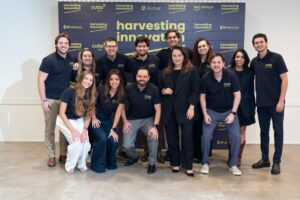The Donald Danforth Plant Science Center has announced AgTech NEXT 2021, a three-part conference series that will discuss three powerful intersections where ag innovation can move the needle on climate change. For the first time, AgTech NEXT is offering registration for free.
“We’ve made it 100% complimentary with the hopes of attracting people who are interested in this conversation but may not have been able to participate otherwise. We’re really excited about the possibility to reach more people,” says Stephanie Regagnon, executive director of innovation partnerships at the Donald Danforth Plant Science Center.
Launched in 2020, AgTech NEXT has taken on a variety of topics in agricultural innovation including how the Covid-19 pandemic has impacted agrifoodtech investing, corporate partnerships, and the rapid rise of plant-based proteins.
For this year’s program, AgTech NEXT is laser-focused on climate change. It doesn’t want to simply talk the talk, however. This conference is all about action.
“We don’t need to talk about climate change anymore and whether it exists. It exists, it is here, it is real, and our industry has a major opportunity to do something about it. We want these conversations to have a bias towards action,” Regagnon says.
This year, AgTech NEXT is piloting a new format to better provide the audience with a major dose of information and insight in a digestible way. The program will take place over the course of three events occurring once a month during the Fall. The new format is designed to provide the audience with more flexibility.
“Some of the feedback we received over the last year is that locking people down for a full day or day-and-a-half is not very realistic. So we are providing brief, powerful sessions with specific themes so people can plug in and get the content that is really interesting to them.”
Lasting roughly one to three hours, each conference will cover a specific topic related to the intersection of climate change and agriculture:
- September 1: The Beginning of the End Game for Carbon & Environmental Markets
- October 6: The Game-Changing Confluence of AgTech and Geospatial
- November 18: The Consequences of Coming Up Short on Climate
Narrowing down the list of topics was a challenge for AgTech NEXT.
“We feel that these three topics are intersections where the agriculture industry, or specifically innovation and research in agriculture, could help move the needle. Farmers are critical to making carbon and environmental markets work,” Regagnon says.
“There are a lot of challenges but also a lot of opportunities. For geospatial, we have a particular strength in St. Louis to bring the agtech and geospatial industries together. For the November session, we all know that climate change is already impacting the developing world more than anywhere else. We must focus on innovation and bringing tools to smallholder farmers.”
For the first session on carbon and environmental markets on September 1, the panel features the CEOs of Bunge and The Nature Conservancy, and the administrator of the US Department of Agriculture (USDA) Agricultural Research Service who currently serves as the acting undersecretary and acting chief scientist at the USDA. Benson Hill’s chief of staff Natalie DiNicola will moderate the keynote panel.
“We specifically chose one person from industry, one from a nonprofit, and one from the government because we want to spark a conversation about how those three sectors must work together but also at times must stay out of each others’ way. We need to find places to collaborate but also identify where specific sectors can lead,” Regagnon urges.
After the panel, the program continues with follow-on sessions called ‘Putting it in Perspective’ to help the audience gain greater knowledge and context. During the conference on carbon and environmental markets, the ‘Put it in Perspective’ sessions will hone in on the farmer’s perspective and the investor’s perspective, according to Regagnon.
Click here to view the entire list of speakers and panelists for each of the three events and register.
Having launched their inaugural event during Covid-19 and all the challenges that it posed, Regagnon is looking forward to seeing how the new three-part conference series plays out.
“Last year was not an ideal time to launch a new conference but we were able to pull off a really great event,” she says. “This year, we’re thrilled that we were able to offer these conversations for free, pull more people in, and get people excited about what is possible in ag innovation.”
You can register for the events here.





